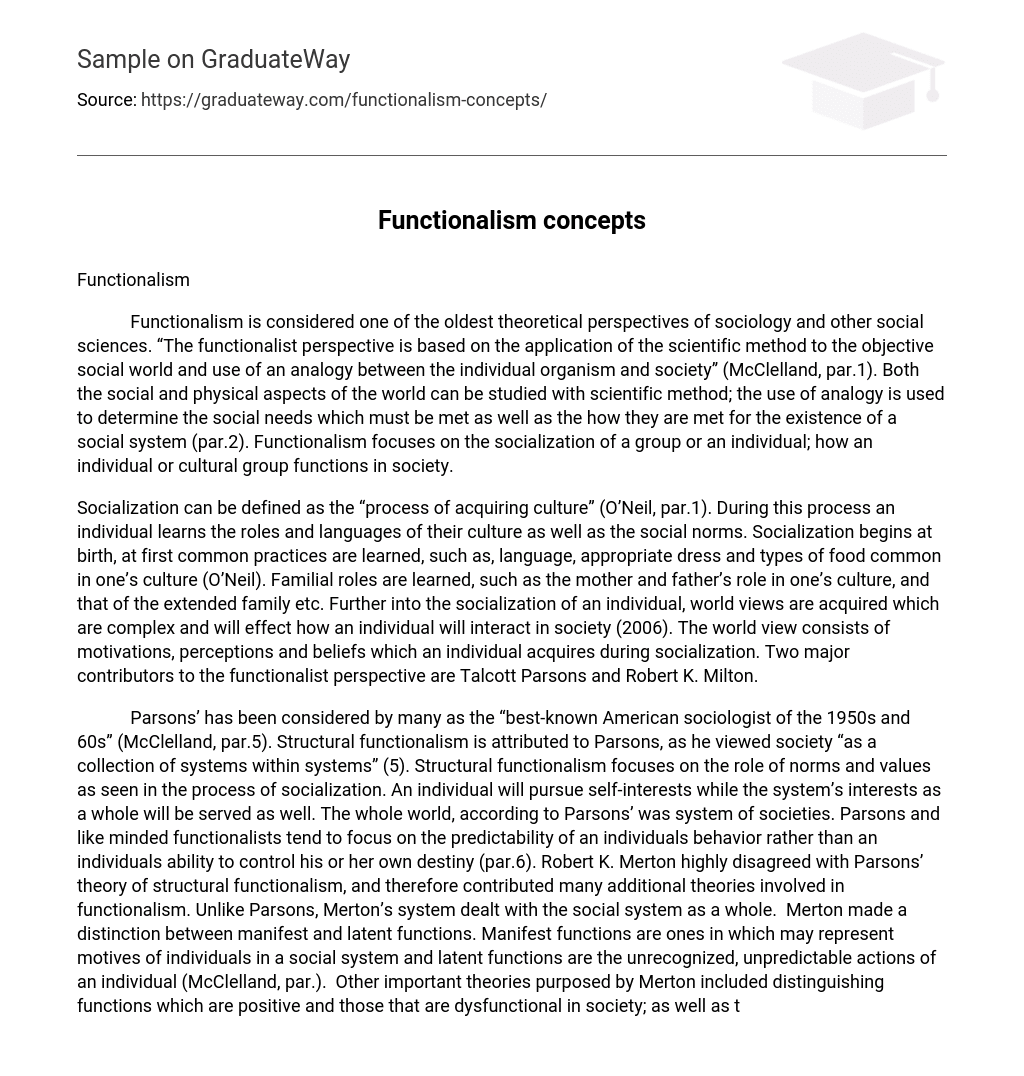Functionalism
Functionalism is considered one of the oldest theoretical perspectives of sociology and other social sciences. “The functionalist perspective is based on the application of the scientific method to the objective social world and use of an analogy between the individual organism and society” (McClelland, par.1). Both the social and physical aspects of the world can be studied with scientific method; the use of analogy is used to determine the social needs which must be met as well as the how they are met for the existence of a social system (par.2). Functionalism focuses on the socialization of a group or an individual; how an individual or cultural group functions in society.
Socialization can be defined as the “process of acquiring culture” (O’Neil, par.1). During this process an individual learns the roles and languages of their culture as well as the social norms. Socialization begins at birth, at first common practices are learned, such as, language, appropriate dress and types of food common in one’s culture (O’Neil). Familial roles are learned, such as the mother and father’s role in one’s culture, and that of the extended family etc. Further into the socialization of an individual, world views are acquired which are complex and will effect how an individual will interact in society (2006). The world view consists of motivations, perceptions and beliefs which an individual acquires during socialization. Two major contributors to the functionalist perspective are Talcott Parsons and Robert K. Milton.
Parsons’ has been considered by many as the “best-known American sociologist of the 1950s and 60s” (McClelland, par.5). Structural functionalism is attributed to Parsons, as he viewed society “as a collection of systems within systems” (5). Structural functionalism focuses on the role of norms and values as seen in the process of socialization. An individual will pursue self-interests while the system’s interests as a whole will be served as well. The whole world, according to Parsons’ was system of societies. Parsons and like minded functionalists tend to focus on the predictability of an individuals behavior rather than an individuals ability to control his or her own destiny (par.6). Robert K. Merton highly disagreed with Parsons’ theory of structural functionalism, and therefore contributed many additional theories involved in functionalism. Unlike Parsons, Merton’s system dealt with the social system as a whole. Merton made a distinction between manifest and latent functions. Manifest functions are ones in which may represent motives of individuals in a social system and latent functions are the unrecognized, unpredictable actions of an individual (McClelland, par.). Other important theories purposed by Merton included distinguishing functions which are positive and those that are dysfunctional in society; as well as those that serve neither. Merton also made theories as to the different levels of society, “the specific social units for which regularized patterns of behavior are functional or dysfunctional” (7). Structural alternatives are also contributed to Merton, which explains that the satisfaction of the functional needs in society’s social structures is not indispensable (McClelland). Merton’s perspective was significant because while he believed the system was balanced, he also believed that the system was inherently flawed, since what might function for one could be a dysfunction for another.
While both functionalists’ point of views were varied, they both believed society had a function in which could affect the needs of individuals. Functional theories have become less popular since the twentieth century, many theorists consider functionalism outdated because it focuses too much on the causes of actions or influences after they occur, rather than before (McClelland). Parsons’ structural functionalist perspective is irrelevant today. It is not realistic to focus on the role of norms and values as seen in the process of socialization as an indicator of an individual’s pursuit of self-interests, and think that the social system’s interests as a whole will be served as well.
References
McClelland, Kent. “Functionalim”. Grinnell College. 24 Feb. 2000. 4 Feb. 2007 < http://web.grinnell.edu/courses/soc/s00/soc111-01/IntroTheories/Functionalism.html#Merton>
O’Neil, David. “Socialization”. Behavioral Sciences Department, Palomar College, San Marcos, California. 2006. 4 Feb. 2007 <http://anthro.palomar.edu/social/soc_1.htm>
Preferred language style: English(U.S.)
What are the main concepts underlying functionalism? Compare and contrast the positions of Parsons versus Robert K. Merton with respect to these concepts. Briefly present your critical opinion of either Parsons or Merton.





